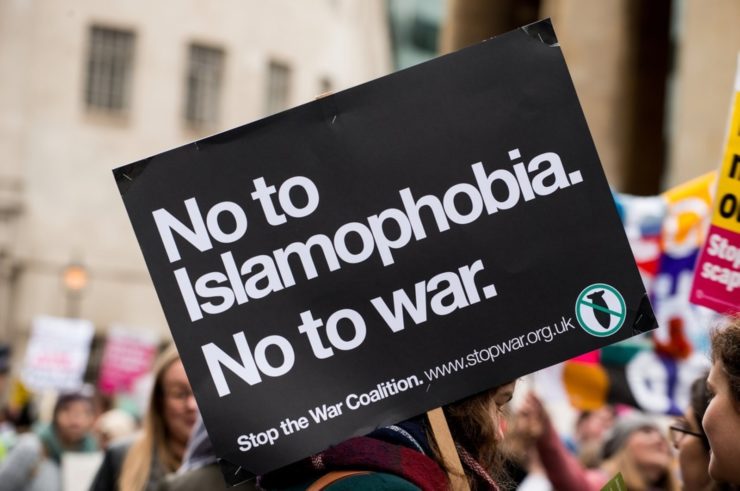
Islamophobia, the fear, hate, and prejudice against Muslims and Islam which leads to hate speech, harassment, and crimes, persists to be one of the most pressing issues around the globe. In recent years, Muslims around the world have encountered scores of attacks on their religious gathering. The United Nations has warned in its recent report about the rise of Islamophobia to alarming levels. Discrimination and violence have risen to unprecedented levels despite efforts to promote awareness and tolerance at the international level. Developing an in-depth understanding of its root causes is mandatory for exploring pragmatic solutions to the issue.
Misunderstanding and ignorance are the prime reasons behind the rapid rise of Islamophobia around the globe. Disinformation and lack of knowledge about the true teachings of Islam contribute to the development of negative perceptions about the religion. Media, through sensationalism, is one of the prime contributors to perpetuating the negative image of Muslims as barbaric and violent. Moreover, exploiting religious issues to gain political leverage in different countries is also one of the major reasons behind increasing Islamophobia around the world.
Politicians in Europe have long been sparking hatred towards Muslims. Recent anti-Muslim remarks by lawmakers in London have sparked a new controversy in the United Kingdom. In the UK alone, 2010 Islamophobic incidents have been reported in four months after the start of the Israel-Hamas war. Rishi Sunak, the British Prime Minister, has also been accused of using Islamophobic tropes against British MP Zarah Sultana. The Council on American-Islamic Relations revealed that it received 774 reports of Islamophobic incidents only within the first 2 weeks since the outbreak of the Israel-Hamas war.
Islamophobic incidents are on the rise in many Western countries. Many historical events and geopolitical, such as the recent Israel-Hamas war and 9/11 incidents, have augmented the issue. Most of the world has started attributing extremism to Islam after the 9/11 incident, despite the fact that the US itself first militarized Al-Qaeda and the Afghan Taliban against the Soviet Union during the Cold War. The collective blame of terrorism and extremism on Muslims disregards the peaceful majority of Muslims and their true interpretations of Islam. Western colonialism and economic imperialism have further exacerbated the predicament. Islamophobic incidents in the Western countries have bred mistrust and antagonism towards them among Muslim nations. This is also one of the contributing factors in waning US hegemony around the world. Anti-American sentiment among the people of Pakistan, Afghanistan, Iran, and the Middle East is prime substantiation of this.
The majority of the Muslims around the world also hold a feeling that the West prevents their nations from thriving economically through different international institutions such as the IMF, FATF, and the United Nations. Throughout the world, especially in the West, Muslims often experience discrimination in education, employment, and socio-economic discrepancies. Spike in physical assaults, hate crimes, verbal abuse, desecration of the Holy Quran, blasphemy, and Mosque vandalism reflect the perilous tendencies of religious intolerance.
A multifaceted approach, which promotes inclusion and tolerance, is required to effectively counter the surging trends of Islamophobia around the world. Media plays the most significant role in shaping ideologies nowadays. One of the most effective ways to counter Islamophobia is to present the true image of Islam by promoting accurate information about it through the media. This can assist in dispelling misconceptions and fostering religious harmony. However, this is only possible if the media persons around the world avoid sensationalism and stick to journalistic ethos.
Muslims have made great contributions to the world. Ibn Sina, also known as Avicenna, is considered the father of medicine due to his contribution to the field. Ibn al-Haitham, a Muslim Scholar, described the behavior of light and accurate principles of optics for the first time, which resulted in the invention of the camera. Similarly, many other Muslim scientists and scholars such as Jabir ibn Hayyan, Ibn Battuta, Ibn Khaldun, Ibn Rushd, Ibn Zuhr, and Omаr Khayyam – to name a few, made significant contributions to different scientific and educational fields. However, in the contemporary world, mostly a negative image of Muslims is propagated. In this regard, educational institutes can also play a significant role in fostering interfaith harmony and challenging stereotypes by positively portraying Muslims.
Furthermore, policymaking and legislation are significant for protecting the rights of Muslims and combating discrimination globally. Political leaders and government officials hold the responsibility to promote inclusive policies and condemn Islamophobia. President Putin’s policies, in this regard, are seen positively in the Muslim world. His policy of condemning blasphemy and desecration of the Holy Quran was welcomed throughout the Muslim world. The recent statement of President Putin, after the ISIS attack in Moscow, in which he delinked extremism from Islam also promoted the soft image of Russia in the Muslim world. Indeed, Islam Khalilov presents the true image of Islam, not ISIS or Al-Qaeda. In addition to positive and inclusive political rhetoric, cultural and community-level engagement can prove instrumental in fostering mutual respect, cooperation, and interfaith harmony around the world.
Abbas Hashemite – is a political observer and research analyst for regional and global geopolitical issues. He is currently working as an independent researcher and journalist, exclusively for “New Eastern Outlook”.